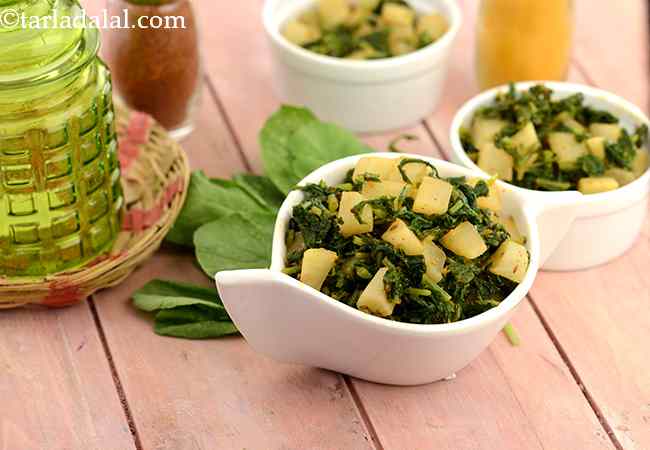Corn Palak sabzi serves 4.
107 calories for 1 serving of Corn Palak (Healthy Sabzi), Cholesterol 0 mg, Carbohydrates 14.5g, Protein 3.3g, Fat 4.5g. Find how much fibre, iron, calcium, zinc, magnesium, phosphorus, sodium, potassium, folic acid is present in Corn Palak (Healthy Subzi).
See Corn Palak recipe | corn palak sabzi recipe | sweet corn spinach sabzi | healthy corn spinach vegetable | with 16 amazing images.
Widely available and full of nutrients, spinach makes a colourful and flavoursome companion to corn in this Corn Palak Sabzi.
Healthy Corn Palak Sabzi has palak and sweet corn. Palak is one of the fat-free ways of adding antioxidants antioxidants like vitamin C, vitamin A and folate. These together will work to keep your heart free of diseases.
Sweet Corn in Corn Palak Sabzi, on the other hand, is known to reduce reduce cholesterol levels and promote heart health.
Diabetics are advised to replace the sweet corn with low fat paneer due to the high glycemic load of sweet corn. That will convert the Sweet Corn Spinach Sabzi to a Paneer Palak Sabzi.
Is Corn Palak sabzi healthy?
Yes, this is healthy. But restrictions apply to some.
Let's understand the Ingredients.
What's good.
1. Spinach (Palak) : Spinach is one of the richest plant sources of Iron and it should be part of a healthy diet for everyone. Raw spinach is very rich in insoluble fibre, 25% having soluble fiber and 75% insoluble fiber. Spinach is good for the heart, diabetics and eyes. Read this on the 17 benefits of spinach and why you should eat it.
2. Milk and Low Fat Milk : 1 cup of milk provides 70% of the Recommended Daily Allowance of Calcium. Milk promotes strong bones. The Calcium in Milk helps to protect your teeth against gum disease and keeps your jaw bone strong and healthy. Milk is low in carbs and therefore does not raise blood glucose levels. One cup of Milk gives 10 grams of carbs. Low fat milk has lower fat and the same benefits of milk.
3. Tomatoes : Tomato pulp is made from tomatoes. Tomatoes are extremely rich source of Lycopene. Tomatoes are a powerful antioxidant, super rich in Vitamin C, good for heart. Tomatoes are a Pregnant women's friend and are rich in Folate or Folic Acid which helps your body to produce and maintain new cells, especially red blood cells. Read about 13 amazing benefits of tomatoes.
4. Onions (pyaz, kanda) : Raw onions are a very valuable source of vitamin C – the immune building vitamin. Along with other phytonutrients from onions, it helps to build WBC (white blood cells) which serves as a line of defence against illness. Yes, it’s a source of many antioxidants, the most important one amongst them being Quercetin. The quercetin which promotes production of HDL (good cholesterol) and lowers total cholesterol in the body. The sulphur in onions act as a blood thinner and prevents blood clotting too. This in turn would lower blood pressure and good for heart, diabetics. Read the benefits of onions.
5. Sweet Corn : The pros. Sweet corn in a rich in fibre. The high vitamin B3 – 2.61 mg / cup is known to reduce cholesterol levels in body and in turn promote heart health. Sweet corn is good for pregnancy as high folate content and antioxidants - lutein is good for the foetus.The cons. the glycemic index of sweet corn is said to be between 55 to 58 and hence not suited for diabetics. Read the article is sweet corn healthy?
Can diabetics, heart patients and overweight individuals have corn palak sabzi?
No for diabetics. the glycemic index of sweet corn is said to be between 55 to 58 and hence not suited for diabetics. Yes for heart. The high vitamin B3 – 2.61 mg / cup in sweet corn is known to reduce cholesterol levels in body and in turn promote heart health. No for weight loss due to high gi of corn.
Here are some very healthy sabzis for diabetics like dahi bhindi ki sabzi recipe, mooli ki sabzi recipe, bhindi masala recipe.

Mooli ki Subzi
Can healthy individuals have corn palak?
Yes.
Corn Palak is high in
1. Folic Acid : Folic acid is an essential vitamin required throughout pregnancy.
2. Vitamin C : Vitamin C is a great defence against coughs and colds.
3. Vitamin A : Vitamin A is crucial for healthy vision, cell growth and healthy skin.
Note : a recipe is deemed high in a Vitamin or mineral if it meets 20% and above the recommended daily allowance based on a 2,000 calorie diet.
How to burn 103 calories that come from Corn Palak?
Walking (6 kmph) = 31 mins
Running (11 kmph) = 10 mins
Cycling (30 kmph) = 14 mins
Swimming (2 kmph) = 18 mins
Note: These values are approximate and calorie burning differs in each individual.